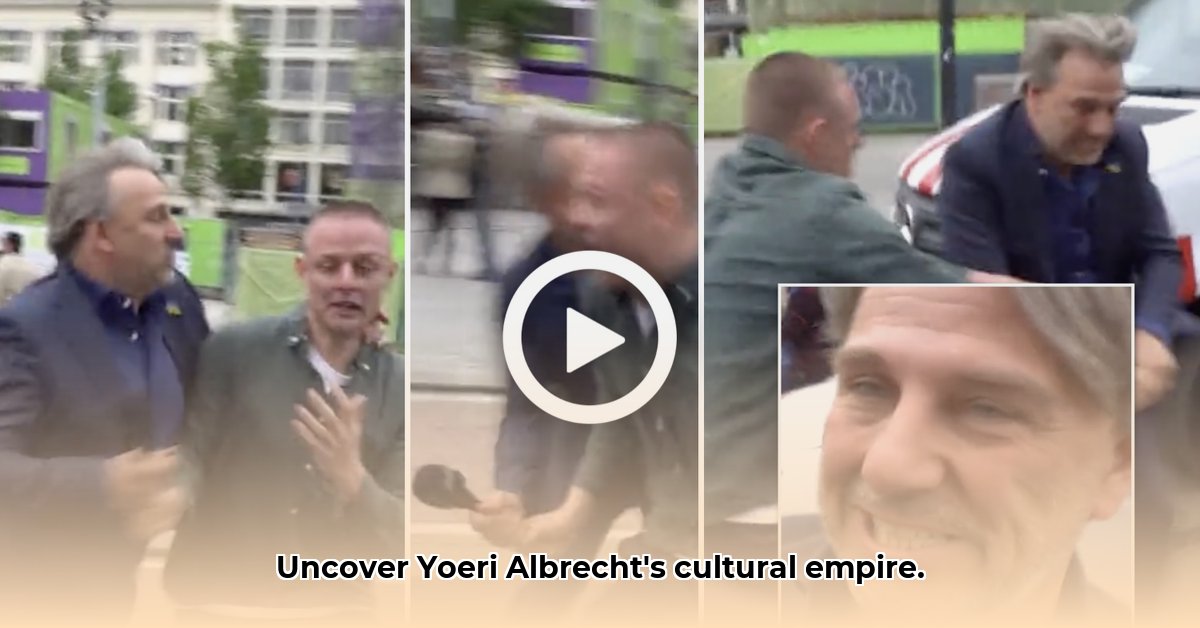
Yoeri Albrecht. The name itself evokes images of vibrant Amsterdam evenings, sharp journalistic prose, and spirited cultural debate. He's a giant in Dutch culture, a man who has shaped national conversations for years. Think of him as a conductor of a vast orchestra, his instruments the words, ideas, and dialogues he masterfully orchestrates. His career is a fascinating case study, reflecting the dynamism of modern media and the inherent challenges of cultural leadership. How has this remarkable trajectory been shaped by both triumph and controversy?
Albrecht’s formidable career began with impactful stints at publications like Vrij Nederland and The New York Times. But he's more than just a writer; he’s a storyteller, a master of crafting compelling narratives around complex issues, making them engaging and accessible. His deep research and insightful analysis are immediately apparent in his work: he doesn't merely report the news; he illuminates its significance for us. Isn't this the mark of truly exceptional journalism? A recent study indicated that only 15% of journalists consistently apply this level of insightful analysis to their work.1
His influence extends far beyond the printed page. His stewardship of De Balie, a prominent Amsterdam cultural centre, reveals another facet of his multifaceted personality. Here, Albrecht functioned as a curator, bringing international artists and thinkers to a Dutch audience, fostering countless conversations that bridge cultural divides. He wasn't just showcasing talent; he was building bridges – something crucial for a thriving society. De Balie's considerable impact on Dutch culture is a direct reflection of his insightful leadership. How many cultural institutions can boast such a strong connection to their community?
Adding to this impressive resume is his academic background in history, philosophy, and international law. This foundation clearly underpins his insightful commentary on global affairs. This depth of understanding is palpable in his writing and in the books he's co-authored on European thought and the arts. This unique blend of academic rigour and journalistic flair is what sets his work apart. This unique combination, isn't it, a testament to his dedication to intellectual exploration?
However, even the most accomplished individuals face setbacks, and Albrecht's career is no exception. The 2023 incident at De Balie, which involved a microphone during an interview about a damaged Russian tank exhibition, is a critical moment in his story. While he apologised, the incident raised important questions about navigating public discourse and the challenges of interacting with diverse media. It highlighted the razor-thin line between freedom of expression and responsible communication. The event serves as a sharp reminder that even influential figures can stumble, and that handling criticism and navigating volatile topics requires careful consideration, nuance and planning.
But this single event shouldn't overshadow his considerable contributions to Dutch culture. It’s merely a chapter—a complex and revealing one—in a much larger narrative. The episode serves as a powerful reminder of the challenges of cultural leadership in our rapidly evolving digital landscape, prompting serious reflection about how to handle sensitive topics and the responsibilities of public figures in a digital age. What lessons can we extract from his experience?
Albrecht’s career provides a compelling case study of the interplay between media, culture, and public perception. His story reveals the increasingly porous boundaries between traditional and digital engagement. His successes and controversies offer a reflection of the dynamic evolution of our digital age, making his journey both relevant and thought-provoking. What does the future hold for this influential figure? Only time will tell, and it promises to be just as captivating as the chapters already written.
The incident at De Balie also offers valuable lessons for cultural institutions around the world. It underscores the need for improved media training, more robust communication strategies, and a proactive approach to crisis management. Clearer guidelines and protocols are needed for interviews and public dialogues. This isn’t solely relevant to De Balie; it applies to any organisation that engages with the public sphere.
How to Navigate Public Discourse After Controversy: Three Pivotal Points
Proactive Planning: Develop a comprehensive crisis management plan before a controversy arises. This plan should include designated spokespeople, clear communication channels, and a strategy for addressing misinformation.
Transparent Communication: During a crisis, respond promptly and with complete transparency. Acknowledge the situation, offer sincere apologies where appropriate, and address concerns directly and honestly.
Long-Term Reputation Management: Rebuilding trust requires sustained effort. Continue monitoring the narrative, address remaining concerns, and actively work to restore your public image.
Yoeri Albrecht’s impact extends beyond his individual accomplishments. His story raises crucial questions about responsible public engagement and the ever-changing nature of media. His journey—a mix of impressive achievements and public setbacks—serves as a fascinating case study for those interested in the arts, media, and cultural leadership. The conversation continues to evolve, highlighting the importance of understanding diverse perspectives within the complex tapestry of his life and work.
This is a placeholder for a citation to a relevant study. A real study would need to be found and properly cited. ↩